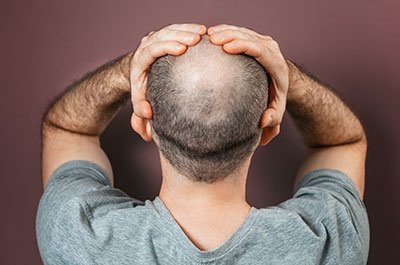It’s always alarming to see a clump of hair in the drain or multiple strands falling out when you brush your hair. But losing hair isn’t always a cause for alarm. In fact, it’s a totally natural part of your hair’s life cycle.
“People tend to underestimate how much hair loss is normal,” says Sumaiya Islam, M.D., a family medicine doctor at Henry Ford Health. “On average, people lose about 50 to 150 strands a day.”
If you’re noticing significantly more stands than that in your brush or the drain—or if your hair is breaking more easily and not growing back—it may be time to talk to your doctor. There are many reasons why you might experience hair loss, and most can be easily remedied. But first, you’ve got to get to the root of the problem.
How Your Hair Grows
Your hair has four stages in its growth cycle:
- Anagen: This is the growth phase, and it can last from 2 to 8 years for any of the strands on your scalp. The majority of the hairs on your head are in the anagen phase at any given time.
- Catagen: This is the transition phase. It lasts about 2 weeks as your hair follicles shrink and strands stop growing.
- Telogen: The resting phase lasts about 2 to 3 months. The strands in that phase are no longer growing, but not yet shedding.
- Exogen: At the end of the hair cycle is the shedding phase when old strands fall out.
A change in any of those phases can potentially result in losing more hair. When you—and your hair—are healthy, most of your hair is in the growth phase, with only a small percentage in the shedding phase. That means that as you shed a typical amount of strands each day, a constant supply of newly growing ones are there to take their place.
Stress and Hair Shedding
In most cases, when your body is stressed, more hairs shift rapidly into the exogen—or shedding—stage. That can result in sudden and noticeable hair loss.
“Anything that causes acute physical or emotional stress to your body can have an impact on your hair,” says Dr. Islam. “When your body is under stress, or you’re going through a stressful event in your life, it affects the hair cycle.”
Physical trauma to the body, like a car accident, surgery, severe illness or childbirth, can create the sort of stress that leads to hair loss. “The body is trying to maintain all the energy in its main organs, and that takes blood supply away from areas it feels are less important—like your hair follicles,” says Dr. Islam.
Emotional stress can have a similar effect. Going through a divorce, dealing with the death of a loved one, caring for someone who is critically ill or even coping with a challenging job can all leave you with hair that’s noticeably thinning.

Hormones and Hair Loss
It’s not unusual for women to experience hair loss that coincides with some major shifts in hormones. There are a couple of key times in a woman’s life when those hormonal fluctuations are so significant that it can result in visibly increased hair shedding.
During pregnancy, levels of estrogen and other hormones stay consistently high. After giving birth, those levels drop quickly. The sudden change can result in more strands of hair falling out in the shower and when you brush your hair.
Some women also experience increased hair loss around menopause. Because estrogen levels decrease at menopause—and stay lower for the rest of your life—this shift can lead to thinner hair as you age.
Hair loss is also a symptom of an underactive thyroid (one that isn’t producing enough thyroid hormone).
How Your Diet Affects Your Hair
It’s no surprise that a diet that’s lacking in essential nutrients can have an effect on how your hair grows, as well as how much falls out. An overall healthy diet is important, but it’s especially critical to make sure you are getting enough:
- Vitamin D, which is necessary to create the cells that develop into hair follicles.
- Iron, to bring oxygen-rich red blood cells to the scalp to help hair follicles grow.
- Vitamin C, essential for helping your body effectively absorb and utilize iron.
Certain medications are also known to result in an increase in hair shedding. Dr. Islam notes that some antibiotics can cause temporary hair shedding, as can some blood pressure medications.
Managing Hair Loss
In many cases, once the cause of the shedding resolves, so will your hair loss. But it’s also important to pay attention to how you care for your hair. Treating your hair and scalp gently can reduce hair loss and breakage, while encouraging new hair growth.
“Hair is at its most sensitive and weakest when it’s wet,” says Dr. Islam. “Avoid tugging on it or using a brush to detangle it. Instead, opt for a wide tooth comb and work through any tangles gently.” You’ll also want to limit things that can damage, break or thin the hair. This can include:
- Drying hair on high heat
- Using chemicals to curl, straighten or color hair
- Pulling hair into tight hairstyles (such as braids) for extended periods of time
If you’re experiencing ongoing hair loss that’s leaving you with thinning hair or even bald spots, talk to your doctor. After they’ve ruled out other treatable causes, they may recommend trying topical minoxidil. Although it requires daily application and can take up to a year to see full results, minoxidil has been shown to promote hair growth.
Reviewed by Sumaiya Islam, M.D., a family medicine doctor at Henry Ford Health.



